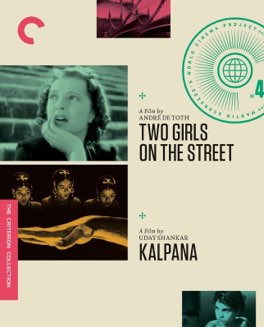ANDRÉ DE TOTH
Two Girls on the Street
I’m unclear what point this film is trying to make, but maybe writing about it will help me figure it out. It’s supposedly a work of “social realism", or, as Criterion calls it, an “ode to the power of working-class female solidarity". I guess. I mean, it’s true that there is definitely a bond-between-women thing going on. But one of the women is a literal aristocrat who has only fallen on hard times because she had the temerity to get pregnant out of wedlock. Not really the stuff of socialist legend.
This is the story of two women. Gyöngyi, the aforementioned aristocrat, and Vica, a naive country girl who has come to the big city in search of work, and ended up on a construction site. Vica is immediately the victim of an attempted rape by her boss, a man she looked up to, and is saved from homelessness by an unlikely encounter with Gyöngyi.
The two end up living as a sort of pseudo mother/daughter couple. At first in relative squalor, but then as the result of a payoff from Gyöngyi’s rich father, they move into the finished building that Vica had been working on. From there the story devolves into a melodrama where they both are interesting in dating the molester boss that attacked Vica in the opening.
It’s a weird turn. More than that though, the film repeatedly undercuts any point it’s trying to make. Is this a solidarity film about women? In that case it’s ruined by them both going for the same man, albeit slightly saved by the “mother” acting like she’s only dating the boss to save her “daughter” from him.
Is it a commentary on class struggle? It certainly seems like it for most of the film. The two women struggle and Vica makes multiple comments about the way people are treated on building sites. The problem is that the very end of the film shows another women being treated identically to how Vica was, but now that she’s the wife of the boss she completely ignores it.
But, actually, maybe that’s the point then? A commentary on the way that upward mobility robs working people of class solidarity. That’s actually pretty good. The melodrama surrounding it made it hard to see, but ok, I’ve sold myself after all.
